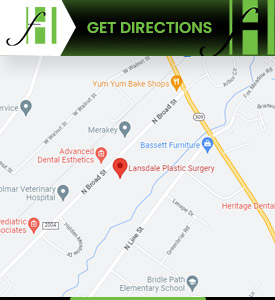Skin Cyst Removal Surgery Specialist Serving Colmar, Lansdale PA
Skin cyst removal surgery involves the excision of cysts to prevent infection, alleviate discomfort, and improve the skin’s appearance. This minor surgical procedure is typically performed under local anesthesia, ensuring a quick recovery with minimal scarring. Our board-certified plastic surgeon, Floyd Herman provides patients with optimal cosmetic and health outcomes at Lansdale Plastic Surgery. For more information, contact us today or book an appointment online. We are conveniently located at 2405 North Broad Street, Colmar, PA 18915.


Table of Contents:
What causes skin cysts?
What are skin cysts filled with?
Do skin cysts need to be removed?
What can happen if a cyst is left untreated?
Skin cysts are common, benign growths that can develop for various reasons. One of the most common reasons for cyst formation is the blockage of the sebaceous glands, which are located across the body, and produce oily sebum that is what keeps the skin hydrated naturally. When these glands are obstructed, sebum accumulates in the affected area, leading to the formation of a cyst through the build-up of sebum. Trauma or injury to the skin, such as cuts or surgical wounds, can also cause cysts to develop. When the skin is injured, it can trap epidermal cells beneath the surface, which then multiply and form a cyst. Certain genetic conditions, such as Gardner’s syndrome or basal cell nevus syndrome, increase the likelihood of developing multiple cysts. These genetic predispositions cause abnormalities in skin cell turnover and growth. Infections can sometimes lead to the formation of cysts; for example, bacterial infections can cause abscesses, a type of cyst filled with pus.
Chronic infections or inflammation, such as in acne, can also result in cyst development. Hormones can affect the activity of sebaceous glands, increasing the risk of blockage and cyst formation. Chronic inflammatory conditions are characterized by chronic inflammation of sweat glands and can lead to recurrent cysts. Persistent inflammation disrupts normal skin structure and function, promoting cyst formation. Occasionally, foreign objects such as splinters or surgical stitches left in the skin can lead to cyst formation as the body reacts to encapsulate the foreign material. Understanding the various causes of skin cysts can help in prevention and treatment. While many cysts are harmless and may resolve on their own, some require medical attention to prevent complications.
Skin cysts are typically small, closed sacs that can develop under the skin, and they are filled with various substances depending on their type. The most common type, a sebaceous cyst, is filled with a thick, oily substance called sebum, which is produced by the sebaceous glands. Epidermoid cysts, another common type, contain a soft, cheese-like material composed of keratin, a protein that is a key component of skin and hair. In the case of pilar cysts, which form around hair follicles, the contents are primarily keratin as well. Some cysts, like ganglion cysts, are filled with a thick, jelly-like fluid, while others, such as abscesses, contain pus, which is a mixture of white blood cells, dead tissue, and bacteria, resulting from an infection. Dermoid cysts, often congenital, can contain a variety of tissues, including hair, skin glands, and even teeth.
The necessity of removing skin cysts depends on several factors, including their size, location, and whether they cause symptoms. Many skin cysts are benign and asymptomatic, often requiring no treatment unless they become bothersome. If a cyst is painful, infected, or grows rapidly, medical intervention might be necessary. Additionally, cysts located in areas prone to irritation or those that cause cosmetic concerns may be candidates for removal. In some cases, doctors may recommend removal to prevent potential complications, such as rupture or further infection. The decision to remove a skin cyst should be made in consultation with a healthcare professional such as a plastic surgeon or dermatologist, who can assess the specific characteristics of the cyst.
If a cyst is left untreated, several potential complications can arise, depending on its type and location. An untreated cyst can become infected, leading to redness, swelling, pain, and the formation of an abscess filled with pus. This infection might spread to surrounding tissues, necessitating more extensive medical treatment. Additionally, some cysts may grow larger over time, causing discomfort or interfering with normal body functions. For instance, a cyst near a joint could impede movement, while one on the scalp might become irritated from brushing or combing hair.
In rare cases, a cyst might rupture spontaneously, releasing its contents into the surrounding tissue and potentially causing inflammation or infection. Furthermore, although most cysts are benign, there is a small risk that they could be or become malignant, so monitoring their growth and changes is essential. Therefore, while many cysts are harmless and may remain stable without intervention, it is important to seek medical advice to manage potential risks effectively. For more information, contact us today or book an appointment online. Visit us online now to meet your team! We are conveniently located at 2405 North Broad Street, Colmar, PA 18915. We serve clients from Colmar PA, Montgomeryville PA, Lansdale PA, Skippack PA, Harleysville PA, Hatfield PA, Blue Bell PA, and surrounding areas!
Check Out Our 5 Star Reviews



Additional Services You May Need
▸ Hand Rejuvenation
▸ Body Contouring
▸ Facial Rejuvenation
▸ Skin Conditions
▸ Arm Lift
▸ Biomax Led Therapy
▸ Blepharoplasty
▸ Body Contouring
▸ Botox & Fillers
▸ Breast Augmentation
▸ Breast Implant Exchange
▸ Breast Implant Removal
▸ Breast Lift
▸ ChinLift
▸ Clinical Facials
▸ Ear Surgery
▸ Facelift
▸ Facial Implants And Flaps
▸ Fat Transfer/Grafting
▸ Female Breast Reduction
▸ Hand Rejuvenation
▸ Hand Surgery
▸ Hyperhidrosis
▸ Juvéderm
▸ Laser Hair Removal
▸ Laser Skin Rejuvenation
▸ Liposuction
▸ Male Breast Reduction
▸ Microneedling
▸ Mommy Makeover
▸ Necklift
▸ Radiesse®
▸ Restylane®
▸ Scar Revision
▸ Skin Cancer Removal
▸ Skin Cyst Removal
▸ Skin Excisions
▸ Skin Lesion
▸ Skin Mole Removal
▸ Tummy Tuck
▸ Upper Lower Eyelid
▸ CO2 Laser Resurfacing



